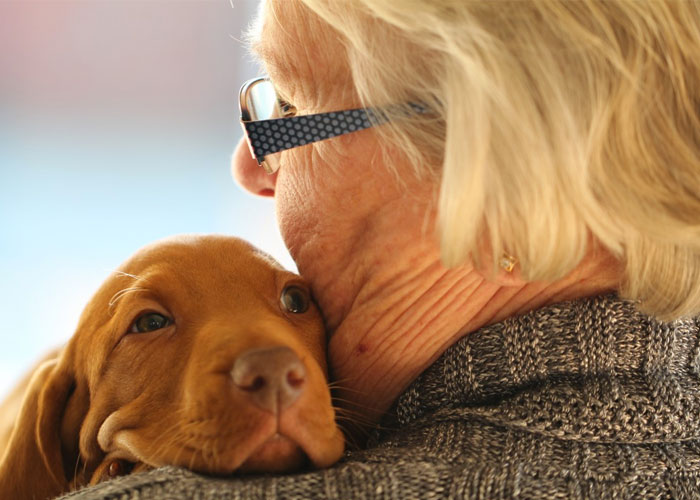5 Benefits of Pet Ownership for Seniors
What a Pet Can Do for a Senior — and the Responsibilities of Pet Ownership
For a senior citizen, or someone approaching that age, the benefits of pet ownership can be both plentiful and profound. Pets provide their owners with affection, love, companionship, and stimulation.
For senior citizens, owning a pet can be incredibly beneficial, offering companionship, reducing loneliness, and even improving physical and mental health. Pets provide unconditional love, reduce stress and anxiety, and can increase social interaction. However, responsible pet ownership requires consideration of the senior’s physical abilities, living situation, and financial resources.
A Pet for a Senior 5 Benefits:
- Senior Companionship and Reduced Loneliness:
Pets provide a constant energetic presence. Pets tend to alleviate feelings of isolation and loneliness, especially for seniors living alone.
- Improved Senior Physical Health:
Caring for a pet, such as walking a dog, watching after your cat as they are outside, can encourage physical activity, which should improve many aspects of health such as cardiovascular health and mobility.
Healthy Pets – CDC — Healthy Pets, Healthy People
- Mental Health Benefits for Elders:
Studies show that pets can lower stress and blood pressure, reduce anxiety and depression, and provide a sense of purpose.
The Value of Pet Ownership for Older Adults
- Senior Social Interaction:
Pet ownership creates opportunities for many types of social interaction, whether through walks in the park or conversations with other pet owners or strangers who love cute animals.
- Elder Emotional Support:
All animals do offer comfort and companionship, particularly for seniors dealing with grief, chronic illness, or disability.
Playing with, interacting with, and caring for pets provides seniors with great health benefits as well – benefits like lower blood pressure, stress management, and increased mental acuity. Pet ownership can also provide great incentive for some seniors to get physical activity that they might not otherwise.
However, pet ownership is not a great fit for every senior. Along with the many benefits of owning and caring for a pet come many responsibilities and daily tasks that not every senior may have the desire or capacity to carry out. Pets need care, feeding, stimulation, and in many cases exercise.
If you’ve decided that the benefits of pet ownership are worth the responsibilities, and are confident that a pet will thrive in the situation you’re considering introducing it, make sure you pick the right type of pet for the situation.
Robotic Pets for Seniors
Realistic animal toys that move. Could these be the type of pet for any situation? Bring comfort, companionship, and playful fun to aging loved ones! From an Orange Tabby Cat to a Pug these evoke joys and excitement of a realistic furry friendship without the responsibility. The look, sound, and feel and state-of-the-art interactive technology tends to create a calming and enriching experience. These pets are proven to ease loneliness, improve attitude, and forge connection with others not just for older adults. For those living with Alzheimer’s disease and related dementia (ADRD) and other diseases this may be just what they need without the food, vet or care bill!
Cat Ownership for Seniors
For many, cat ownership is the best and most obvious fit for seniors. Cats are affectionate and fun to play with. They are also comparatively independent creatures that do not require as much hands-on daily care as some other pets.
But cats also can be temperamental pets and seniors with compromised immune systems should probably steer clear of owning a cat.
The Benefits of Dog Ownership for Seniors
Dogs are also potentially a great fit for many seniors. They are fun-loving, affectionate, provide a sense of security and safety in some cases, and are always ready for activity and exercise.
Depending on the breed, dogs can vary widely when it comes to temperament and their need for exercise and mental stimulation. Puppies in general may not be a good fit for many seniors, but adopting an older dog can be a great way for a senior to find companionship and good motivation to keep going for daily walks.
When selecting a dog for a senior, make sure the dog’s daily needs and temperament are a great match for the senior’s capacity and drive.
Responsibilities of Pet Ownership for Seniors:
- Financial Considerations:
Pet ownership involves costs for food, veterinary care, grooming, and potential emergencies.
- Physical Limitations:
Seniors with mobility issues may need assistance with pet care tasks like walking, feeding, or cleaning.
- Home Environment:
Consider the size and energy level of the pet in relation to the senior’s living space.
- Long-term Care:
Seniors need to consider who will care for their pet if they become unable to do so themselves.
- Pet’s Needs:Ensuring the pet’s needs for exercise, mental stimulation, and veterinary care are met is crucial.
Tips for Responsible Pet Ownership:
- Choose the right pet:
Consider the senior’s lifestyle, living space, and physical abilities when selecting a pet.
- Seek assistance:
Utilize family, friends, or professional pet sitters for support with pet care.
- Plan for the future:
Make arrangements for pet care in case of illness or hospitalization.
- Consult with a veterinarian:Regular check-ups and preventative care are essential for maintaining the pet’s health.
The Benefits of Birds, Fish, and Other Pets for Seniors
It can be tempting to make the choice between a cat or a dog and leave it at that, but in many cases the perfect pet may not be either. Many seniors get the same benefits from taking care of a reptile, bird, rodent, fish, or other type of pet that they would from owning a dog or cat.
As always, make sure that the level of care and general needs of the animal will not be too much for the senior.
The Right Fit When Searching for the Perfect Pet
If you are considering taking on a pet later in life, or if you are caring for a senior and considering getting them a pet or weighing whether or not it’s time for them to give up a pet they already have, make sure to balance the responsibilities of pet care against the benefits of pet ownership.
Pet ownership has a great many positive attributes for seniors, but getting the right pet for each unique senior person is key.
Resources to help Mom and Dad from Golden Placements:
Golden Placements helps you manage resources and takes care of the leg work. We offer resources for finding your best living situation so you can enjoy your best Golden Years. GPS has ideas gathered over years of experience by being Senior Life Specialists. Portland Senior Living and their various options from our Golden Girls specialists are IS NO COST.- You can call us today or continue to read more about Long Term Care Planning with our friends at ACL
- Oregon Defines and Describes ADLs for us legally here: Long Term Care
- Golden Placements RESOURCES to find CARE Services
- Quality locations for you Senior Loved One with the Golden Girls
- Senior Living Near Me – Adult Home Placement
- Explore Residential Care Homes for Elderly “near me”
Diane Delaney, Placement Specialist Extraordinaire

Stephanie Brubaker, Senior Placement Specialist

Posted onTrustindex verifies that the original source of the review is Google. Golden Placement Services answered! It’s really difficult to have to place an aging parent into a facility, but our family knew it was time. So I did some research, called 15 facilities, and managed to get on one wait list. I also called two companies that assist with finding homes, and they said they could not help. We were concerned we wouldn’t find a place, and if we did, it could be a very poor choice for our dad. Then I was given Golden Placement Services phone number and I spoke with a lovely woman named LaVona. That’s when everything changed! LaVona listened to our family’s needs, was understanding, and within days, she had arranged places for us to visit. How she found them, I don’t know, but she did! She met us there, listened some more, answered questions, and offered sage advice. We will forever be grateful for Golden Placement Services help in making this very tough decision. We absolutely know that my dad is in the right place to spend the rest of his life. And, we wouldn’t have that assurance today, had we not been connected with their wonderful service! They have blessed us greatly and we are sharing their information with others we know who are going through the same process.Posted onTrustindex verifies that the original source of the review is Google. Our family is so grateful for Diane and her company. They have helped us, two times find placements for our family members. We are now working now to find a great situation for another elderly family member.. Best thing, THEY CARE about each client and their wellbeing... THANK YOU, DianePosted onTrustindex verifies that the original source of the review is Google. What a great resource for seniors in this area. Great, honest work. Very knowledgeable.Posted onTrustindex verifies that the original source of the review is Google. They were very helpful and while being professional, kind and caring. They were thorough in trying to find the best arrangement for our situation and followed-up to make sure client's new arrangements were satisfactory. I highly recommend them.
-
General terms for dementia:“dementia,” “Alzheimer’s,” “cognitive impairment,” “memory loss,” “thinking difficulties”.
-
Types of dementia:“Lewy body dementia,” “vascular dementia,” “frontotemporal dementia,” “mixed dementia,” “dementia with Lewy bodies”.
-
Related topics to dementia:“dementia care,” “dementia support,” “dementia diagnosis,” “dementia symptoms,” “dementia research”.
- compulsive hoarding
- senior fall prevention
- elderly fall risk
- fall proofing home
- home safety for seniors
- senior care
- assisted living
- nursing home
- senior placement
- in-home care
- occupational therapy
- physical therapy
- geriatric care
- senior living options
- fall prevention tips
- elderly safety
- senior home safety
- fall risk assessment
- senior care services
- senior living communities
- aging in place
- Elderly Care Services – Senior Placement Services – Assisted Living Services Senior Living Referral Services Retirement Homes & Senior Living Communities, Assisted Living Services, Senior Resources






